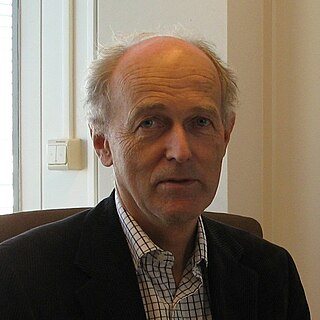Related Research Articles

Barry W. Boehm is an American software engineer, distinguished professor of computer science, industrial and systems engineering; the TRW Professor of Software Engineering; and founding director of the Center for Systems and Software Engineering at the University of Southern California. He is known for his many contributions to the area of software engineering.
Information engineering (IE), also known as Information technology engineering (ITE), information engineering methodology (IEM) or data engineering, is a software engineering approach to designing and developing information systems.
Peter Pin-Shan Chen is a Taiwanese American computer scientist. He is a distinguished career scientist and faculty member at Carnegie Mellon University, who is known for the development of the entity-relationship model in 1976.
The World Wide Web has become a major delivery platform for a variety of complex and sophisticated enterprise applications in several domains. In addition to their inherent multifaceted functionality, these Web applications exhibit complex behaviour and place some unique demands on their usability, performance, security, and ability to grow and evolve. However, a vast majority of these applications continue to be developed in an ad-hoc way, contributing to problems of usability, maintainability, quality and reliability. While Web development can benefit from established practices from other related disciplines, it has certain distinguishing characteristics that demand special considerations. In recent years, there have been developments towards addressing these considerations.
Harlan D. Mills was Professor of Computer Science at the Florida Institute of Technology and founder of Software Engineering Technology, Inc. of Vero Beach, Florida. Mills' contributions to software engineering have had a profound and enduring effect on education and industrial practice. Since earning his Ph.D. in Mathematics at Iowa State University in 1952, Mills led a distinguished career.

Jean Leonardus Gerardus (Jan) Dietz is a Dutch Information systems researcher, Emeritus Professor of Information Systems Design, and part-time Professor of Enterprise Engineering at the Delft University of Technology, known for the development of the Design & Engineering Methodology for Organizations. and his work on enterprise ontology.
Enterprise engineering is defined as the body of knowledge, principles, and practices to design all or part of an enterprise. An enterprise is a complex, socio-technical system that comprises interdependent resources of people, information, and technology that must interact with each other and their environment in support of a common mission. According to Kosanke, Vernadat and Zelm, enterprise engineering is an enterprise life-cycle oriented discipline for the identification, design, and implementation of enterprises and their continuous evolution, supported by enterprise modelling. The discipline examines each aspect of the enterprise, including business processes, information flows, material flows, and organizational structure. Enterprise engineering may focus on the design of the enterprise as a whole, or on the design and integration of certain business components.

Enterprise life cycle (ELC) in enterprise architecture is the dynamic, iterative process of changing the enterprise over time by incorporating new business processes, new technology, and new capabilities, as well as maintenance, disposition and disposal of existing elements of the enterprise.
Alain Wegmann is a Swiss computer scientist, professor of Systemic Modeling at the École Polytechnique Fédérale de Lausanne (EPFL), and Information Technology and Services consultant, known for the development of the Systemic Enterprise Architecture Methodology (SEAM).

Systems modeling or system modeling is the interdisciplinary study of the use of models to conceptualize and construct systems in business and IT development.
In software engineering, a software development process is the process of dividing software development work into distinct phases to improve design, product management, and project management. It is also known as a software development life cycle (SDLC). The methodology may include the pre-definition of specific deliverables and artifacts that are created and completed by a project team to develop or maintain an application.
Junichi Iijima, Japanese, Enterprise Engineer and Professor of the Department of Industrial Management and Engineering at the Tokyo Institute of Technology in Japan.
Henderik Alex (Erik) Proper is a Dutch computer scientist, Professor of Information Systems at the Radboud University Nijmegen, and IT consultant, known for work on conceptual modelling of information systems and enterprise engineering.
Johannes Adrianus Petrus (Jan) Hoogervorst is a Dutch organizational theorist, business executive, management consultant, and Professor Enterprise Governance and Enterprise Engineering at the University of Antwerp, known for his work in the field of enterprise engineering.
J.B.F. (Hans) Mulder is a Dutch computer scientist, Venture manager in the IT industry, and Professor at the University of Antwerp, known for his work on enterprise engineering.
Robert Winter is a German business theorist, Professor of business & information systems engineering at the University of St. Gallen, and director of its Institute of Information Management. He is known for his contributions in the field of Enterprise Architecture and Business Engineering.
Martinus (Martin) Op 't Land is a Dutch organizational theorist, consultant and Professor of Enterprise Engineering at the University of Antwerp and at Antwerp Management School, known for his contributions in the field of Enterprise Architecture.
Herwig Mannaert is a Belgian academic and Professor at the University of Antwerp, Dean of the Management Information Systems Department, and Executive Professor at the University of Antwerp Management School, known for his work on digital image processing, software architecture, and open source software.
Danny Greefhorst is a Dutch enterprise architect and consultant at ArchiXL, known for his work in the field of enterprise architecture.
References
- ↑ Huysmans, P., Bellens, D., Van Nuffel, D., & Ven, K. (2010). "Aligning the constructs of enterprise ontology and normalized systems". In Advances in Enterprise Engineering IV (pp. 1-15). Springer Berlin Heidelberg.
- 1 2 3 Sulayman K. Sowe et al. Emerging Free and Open Source Software Practices. (2008) p. 284
- ↑ Jan Verelst at DBLP Bibliography Server

- ↑ Verelst, Jan (82) Academic bibliography